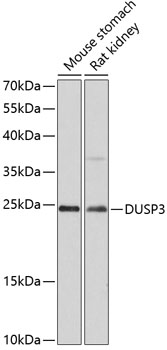Anti-DUSP3 Antibody (CAB12068)
- SKU:
- CAB12068
- Product type:
- Antibody
- Reactivity:
- Mouse
- Rat
- Host Species:
- Rabbit
- Isotype:
- IgG
- Antibody Type:
- Polyclonal Antibody
- Research Area:
- Cell Biology
Description
| Antibody Name: | Anti-DUSP3 Antibody |
| Antibody SKU: | CAB12068 |
| Antibody Size: | 20uL, 50uL, 100uL |
| Application: | WB |
| Reactivity: | Mouse, Rat |
| Host Species: | Rabbit |
| Immunogen: | Recombinant fusion protein containing a sequence corresponding to amino acids 1-185 of human DUSP3 (NP_004081.1). |
| Application: | WB |
| Recommended Dilution: | WB 1:500 - 1:1000 |
| Reactivity: | Mouse, Rat |
| Positive Samples: | Mouse stomach, Rat kidney |
| Immunogen: | Recombinant fusion protein containing a sequence corresponding to amino acids 1-185 of human DUSP3 (NP_004081.1). |
| Purification Method: | Affinity purification |
| Storage Buffer: | Store at -20°C. Avoid freeze / thaw cycles. Buffer: PBS with 0.02% sodium azide, 50% glycerol, pH7.3. |
| Isotype: | IgG |
| Sequence: | MSGS FELS VQDL NDLL SDGS GCYS LPSQ PCNE VTPR IYVG NASV AQDI PKLQ KLGI THVL NAAE GRSF MHVN TNAN FYKD SGIT YLGI KAND TQEF NLSA YFER AADF IDQA LAQK NGRV LVHC REGY SRSP TLVI AYLM MRQK MDVK SALS IVRQ NREI GPND GFLA QLCQ LNDR LAKE GKLK P |
| Gene ID: | 1845 |
| Uniprot: | P51452 |
| Cellular Location: | Nucleus |
| Calculated MW: | 16kDa/20kDa |
| Observed MW: | 20kDa |
| Synonyms: | DUSP3, VHR |
| Background: | The protein encoded by this gene is a member of the dual specificity protein phosphatase subfamily. These phosphatases inactivate their target kinases by dephosphorylating both the phosphoserine/threonine and phosphotyrosine residues. They negatively regulate members of the mitogen-activated protein (MAP) kinase superfamily (MAPK/ERK, SAPK/JNK, p38), which are associated with cellular proliferation and differentiation. Different members of the family of dual specificity phosphatases show distinct substrate specificities for various MAP kinases, different tissue distribution and subcellular localization, and different modes of inducibility of their expression by extracellular stimuli. This gene maps in a region that contains the BRCA1 locus which confers susceptibility to breast and ovarian cancer. Although DUSP3 is expressed in both breast and ovarian tissues, mutation screening in breast cancer pedigrees and in sporadic tumors was negative, leading to the conclusion that this gene is not BRCA1. |
| UniProt Protein Function: | DUSP3: a non-receptor, dual-specificity phosphoprotein phosphatase (DUSP). Different members of the DUSP family show distinct substrate specificities for MAPKs, different tissue distribution and subcellular localization, and different modes of inducibility of their expression by extracellular stimuli. DUSP3 inactivates the mitogen-activated kinases Erk2 and Jnk and is phosphorylated by ZAP-70. Phosphorylation by ZAP-70 is required for DUSP3 to inhibit the Erk2-Elk-1 pathway. |
| UniProt Protein Details: | Protein type:EC 3.1.3.48; EC 3.1.3.16; Motility/polarity/chemotaxis; Protein phosphatase, dual-specificity Chromosomal Location of Human Ortholog: 17q21 Cellular Component: nucleoplasm; cytoplasm; immunological synapse; nucleus; cytosol Molecular Function:MAP kinase phosphatase activity; protein tyrosine/serine/threonine phosphatase activity; protein tyrosine phosphatase activity Biological Process: negative regulation of JNK cascade; nerve growth factor receptor signaling pathway; in utero embryonic development; negative regulation of MAPKKK cascade; MyD88-independent toll-like receptor signaling pathway; stress-activated MAPK cascade; negative regulation of T cell receptor signaling pathway; toll-like receptor 3 signaling pathway; positive regulation of mitotic cell cycle; toll-like receptor 10 signaling pathway; toll-like receptor 2 signaling pathway; toll-like receptor 5 signaling pathway; MyD88-dependent toll-like receptor signaling pathway; toll-like receptor signaling pathway; innate immune response; toll-like receptor 9 signaling pathway; toll-like receptor 4 signaling pathway; negative regulation of T cell activation; inactivation of MAPK activity |
| NCBI Summary: | The protein encoded by this gene is a member of the dual specificity protein phosphatase subfamily. These phosphatases inactivate their target kinases by dephosphorylating both the phosphoserine/threonine and phosphotyrosine residues. They negatively regulate members of the mitogen-activated protein (MAP) kinase superfamily (MAPK/ERK, SAPK/JNK, p38), which are associated with cellular proliferation and differentiation. Different members of the family of dual specificity phosphatases show distinct substrate specificities for various MAP kinases, different tissue distribution and subcellular localization, and different modes of inducibility of their expression by extracellular stimuli. This gene maps in a region that contains the BRCA1 locus which confers susceptibility to breast and ovarian cancer. Although DUSP3 is expressed in both breast and ovarian tissues, mutation screening in breast cancer pedigrees and in sporadic tumors was negative, leading to the conclusion that this gene is not BRCA1. [provided by RefSeq, Jul 2008] |
| UniProt Code: | P51452 |
| NCBI GenInfo Identifier: | 1718191 |
| NCBI Gene ID: | 1845 |
| NCBI Accession: | P51452.1 |
| UniProt Secondary Accession: | P51452,Q5U0J1, Q8IYJ9, D3DX45, |
| UniProt Related Accession: | P51452 |
| Molecular Weight: | 16,163 Da |
| NCBI Full Name: | Dual specificity protein phosphatase 3 |
| NCBI Synonym Full Names: | dual specificity phosphatase 3 |
| NCBI Official Symbol: | DUSP3 |
| NCBI Official Synonym Symbols: | VHR |
| NCBI Protein Information: | dual specificity protein phosphatase 3; vaccinia H1-related phosphatase; vaccinia virus phosphatase VH1-related; dual specificity protein phosphatase VHR; serine/threonine specific protein phosphatase |
| UniProt Protein Name: | Dual specificity protein phosphatase 3 |
| UniProt Synonym Protein Names: | Dual specificity protein phosphatase VHR; Vaccinia H1-related phosphatase; VHR |
| Protein Family: | Dual specificity protein phosphatase |
| UniProt Gene Name: | DUSP3 |
| UniProt Entry Name: | DUS3_HUMAN |








